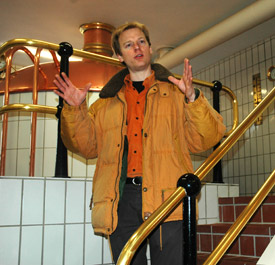OK, change of plan. Yesterday’s discussion about whether consumers will continue to accept the idea Foster’s is “Australian for beer” when four out of five pints are brewed in the United Kingdom was to be followed with more about the importance of authenticity to both brewers and beer drinkers.
We’ll do that, but instead of starting from conversations during the Craft Brewers Conference in Seattle (the insiders’ view), there’s an outsider’s view worth reading. New York Times wine writer Eric Asimov writes in his blog, The Pour:
I always enjoy writing about beer. Occasionally, though, I am mystified by the hard-core beer lovers, who crave respect and recognition for the wonderful artisanal brews that are now available, but sometimes seem intolerant of anyone outside their realm who addresses the subject.
Let’s own up to the fact he’s talking about us. If you’re reading this then you must be hard-core, because this blog is a niche within a niche (the craft beer market). That doesn’t mean you have to be intolerant. On the other hand, perhaps you don’t think intolerant is such a bad idea (sorry, I do).
Hear him out.
I can understand their feelings, I think. Many of them have carried the torch for beer for many years without much recognition, and they naturally feel a certain amount of ownership of the subject. After a while, insularity becomes comforting, especially when the culture as a whole seems so much more interested in industrial swill than great beer.
But the attitude goes deeper than that. Many connoisseurs I’ve spoken with want to see beer given the same sort of cultural obeisance as wine. They want it to be regarded as a complex, delicious, worthy art form, yet they quail at the pretentiousness that trails after wine. In fact, beer lovers are so afraid of anything that even hints of pretension that they ward it off like God-fearing peasants making the signs of the cross at vampires.
Put a bunch of beer-lovers in a room and chances are you will see an utter disregard of fashion: goofy T-shirts, bizarre ties, wild, unruly facial hair and haircuts that could not possibly have been rendered by a professional. In short, you have the same determinedly nonconformist demographic as you would at a science-fiction convention.
Calm down. He admits that at the end he’s having a bit of fun. Back up to the part where he talks about ownership (that doesn’t mean you shouldn’t look in the mirror while you read the rest).
Listen to Saint Arnold Brewing founder Brock Wagner, whose customers donated money so the brewery could upgrade its system. “I can’t really say why they did it other than I’ve come to realize I may own the stock, but it’s not my brewery,” he said. “It belongs to everybody who drinks Saint Arnold beer.”
Maybe you don’t find it easy to be so generous. At the risk of sounding pretentious, the American beer revolution has been about reclaiming the soul of beer from industrial producers, and that required a certain brashness.
Dogfish Head Brewery founder Sam Calagione put it this way in his Craft Brewers Conference keynote address:
“Americans will always vehemently protect their right to create an alternative. Not just an alternative to giant breweries – which is what we represent – but to the increasing corporatization of American culture.
“It’s not outlandish to recognize our boiling kettles as modern day melting pots – the sources of beers as diverse and colorful as the people who buy them. Made by people as diverse and colorful as the people who buy them.”
That’s about as authentic as it gets. It belongs to all of us, and to none of us.
 Matthais Trum (pictured here giving a tour of the brewery) points out that the lager contains none of the smoked malt that
Matthais Trum (pictured here giving a tour of the brewery) points out that the lager contains none of the smoked malt that